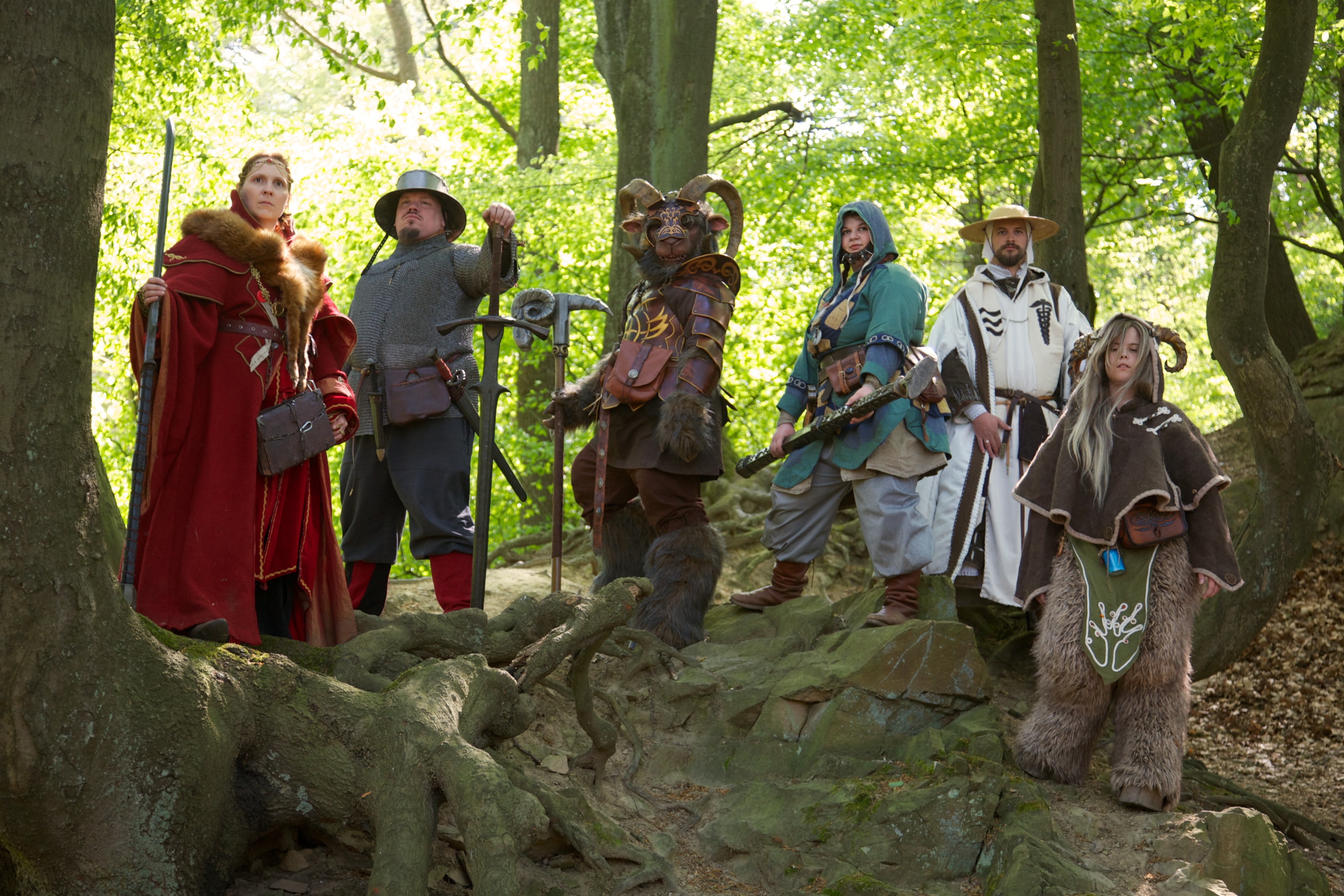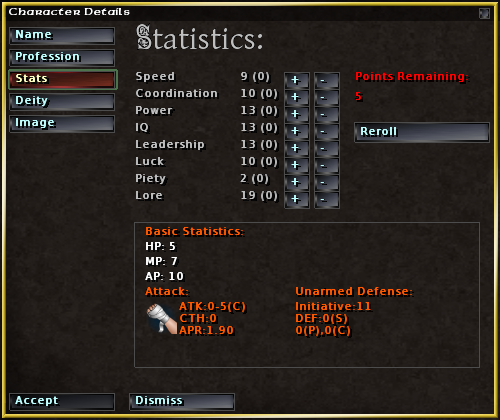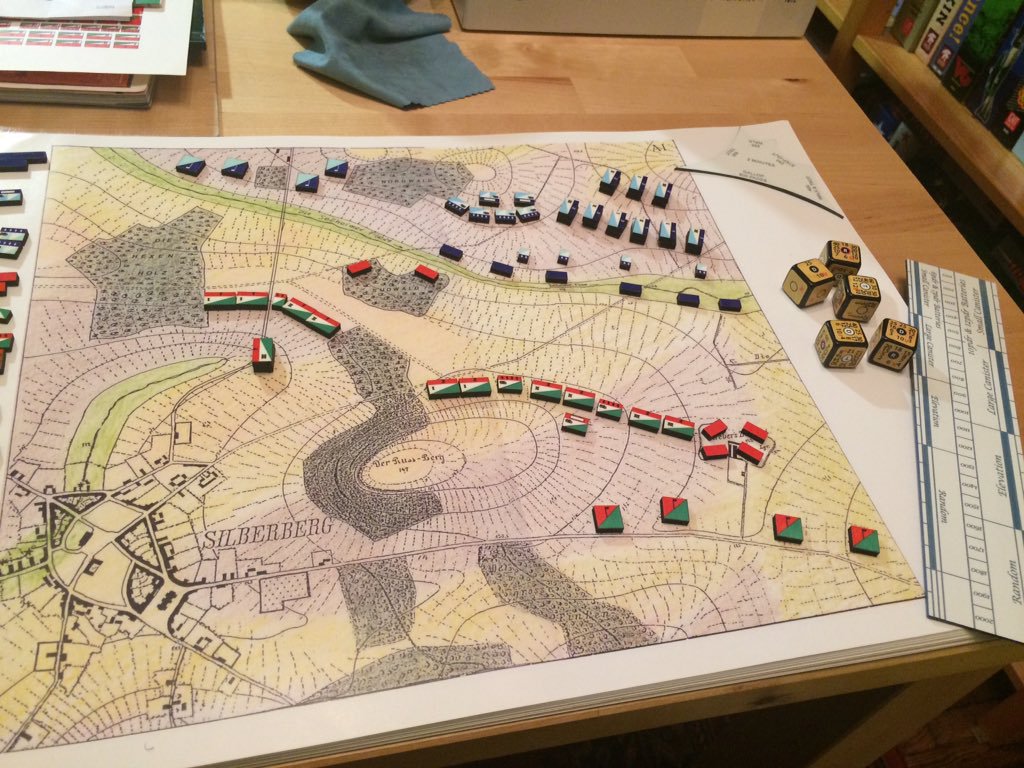|
Role-playing Game (pen And Paper)
A tabletop role-playing game (TTRPG or TRPG), also known as a pen-and-paper role-playing game, is a kind of role-playing game (RPG) in which the participants describe their characters' actions through speech and sometimes movements. Participants determine the actions of their characters based on their characterization, and the actions succeed or fail according to a set formal system of rules and guidelines, usually involving randomization (such as through dice). Within the rules, players have the freedom to improvise, and their choices shape the direction and outcome of the game. Neither pen and paper nor a table are strictly necessary for a game to count as a TTRPG; rather, the terms ''pen-and-paper'' and ''tabletop'' are typically used to distinguish this format of RPG from role-playing video games or live action role-playing games. Online play of TTRPGs through videoconferencing has become common since the COVID-19 pandemic. Some common examples of tabletop role-playing games in ... [...More Info...] [...Related Items...] OR: [Wikipedia] [Google] [Baidu] |
Role-playing Game
A role-playing game (sometimes spelled roleplaying game, or abbreviated as RPG) is a game in which players assume the roles of player character, characters in a fictional Setting (narrative), setting. Players take responsibility for acting out these roles within a narrative, either through literal acting or through a process of structured decision-making regarding character development. Actions taken within many games succeed or fail according to a formal role-playing game system, system of rules and guidelines. There are several forms of role-playing games. The original form, sometimes called the tabletop role-playing game (TRPG or TTRPG), is conducted through discussion, whereas in live action role-playing game, live action role-playing (LARP), players physically perform their characters' actions.(Tychsen et al. 2006:255) "LARPs can be viewed as forming a distinct category of RPG because of two unique features: (a) The players physically embody their characters, and (b) the g ... [...More Info...] [...Related Items...] OR: [Wikipedia] [Google] [Baidu] |
Statistic (role-playing Games)
A statistic (or stat) in role-playing games is a piece of data that represents a particular aspect of a fictional character. That piece of data is usually a ( unitless) integer or, in some cases, a set of dice. For some types of statistics, this value may be accompanied with a descriptive adjective, sometimes called a ''specialisation'' or ''aspect'', that either describes how the character developed that particular score or an affinity for a particular use of that statistic (like ''Specialisations'' in '' Ars Magica'' or ''Attribute Aspects'' in ''Aria''). Most games divide their statistics into several categories. The set of categories actually used in a game system, as well as the precise statistics within each category, vary greatly. The most often used types of statistic include: * Attributes describe to what extent a character possesses natural, in-born characteristics common to all characters. * Advantages and disadvantages are useful or problematic characteristics th ... [...More Info...] [...Related Items...] OR: [Wikipedia] [Google] [Baidu] |
Chess Variants
A chess variant is a game related to, derived from, or inspired by chess. Such variants can differ from chess in many different ways. "International" or "Western" chess itself is one of a family of games which have related origins and could be considered variants of each other. Chess developed from ''chaturanga'', from which other members of this family, such as '' ouk chatrang'', ''shatranj'', Tamerlane chess, ''shogi'', and ''xiangqi'' also evolved. Many chess variants are designed to be played with the equipment of regular chess. Most variants have a similar public-domain status as their parent game, but some have been made into commercial proprietary games. Just as in traditional chess, chess variants can be played over the board, by correspondence, or by computer. Some internet chess servers facilitate the play of some variants in addition to orthodox chess. In the context of chess problems, chess variants are called heterodox chess or fairy chess. Fairy chess variants te ... [...More Info...] [...Related Items...] OR: [Wikipedia] [Google] [Baidu] |
Chaturanga
Chaturanga (, , ) is an Traditional games of India, ancient Indian Strategy game, strategy board game. It is first known from India around the seventh century AD. While there is some uncertainty, the prevailing view among chess historians is that chaturanga is the common ancestor of the board games chess, xiangqi (Chinese), janggi (Korean), shogi (Japanese), sittuyin (Burmese), makruk (Thai), makruk, ouk chatrang (Cambodian) and modern Indian chess. It was adopted as ''chatrang'' (''shatranj'') in Sassanid Persia, which in turn was the form of chess brought to Late Middle Ages, late-medieval Europe. Not all the rules of chaturanga are known with certainty. Chess historians suppose that the game had similar rules to those of its successor, shatranj. In particular, there is uncertainty as to the moves of the gaja (elephant). Etymology Sanskrit ' is a bahuvrihi compound word, meaning "having four limbs or parts" and in epic poetry often meaning "army".Meri 2005: 148 The name come ... [...More Info...] [...Related Items...] OR: [Wikipedia] [Google] [Baidu] |
Chess
Chess is a board game for two players. It is an abstract strategy game that involves Perfect information, no hidden information and no elements of game of chance, chance. It is played on a square chessboard, board consisting of 64 squares arranged in an 8×8 grid. The players, referred to as White and Black in chess, "White" and "Black", each control sixteen Chess piece, pieces: one king (chess), king, one queen (chess), queen, two rook (chess), rooks, two bishop (chess), bishops, two knight (chess), knights, and eight pawn (chess), pawns, with each type of piece having a different pattern of movement. An enemy piece may be captured (removed from the board) by moving one's own piece onto the square it occupies. The object of the game is to "checkmate" (threaten with inescapable capture) the enemy king. There are also several ways a game can end in a draw (chess), draw. The recorded history of chess goes back to at least the emergence of chaturanga—also thought to be an ancesto ... [...More Info...] [...Related Items...] OR: [Wikipedia] [Google] [Baidu] |
Strategy Game
A strategy game or strategic game is a game in which the players' uncoerced, and often autonomous, decision-making skills have a high significance in determining the outcome. Almost all strategy games require internal decision tree-style thinking, and typically very high situational awareness. Strategy games are also seen as a descendant of war games, and define strategy in terms of the context of war, but this is more partial. A strategy game is a game that relies primarily on strategy, and when it comes to defining what strategy is, two factors need to be taken into account: its complexity and game-scale actions, such as each placement in the ''Total War'' video game series. The definition of a strategy game in its cultural context should be any game that belongs to a tradition that goes back to war games, contains more strategy than the average video game, contains certain gameplay conventions, and is represented by a particular community. Although war is dominant in strate ... [...More Info...] [...Related Items...] OR: [Wikipedia] [Google] [Baidu] |
Wargaming
A normal wargame is a strategy game in which two or more players command opposing armed forces in a simulation of an armed conflict. Wargaming may be played for recreation, to train military officers in the art of strategic thinking, or to study the nature of potential conflicts. Many wargames re-create specific historic battles, and can cover either whole wars, or any campaigns, battles, or lower-level engagements within them. Many simulate land combat, but there are wargames for naval, air combat, and cyber conflicts, as well as many that combine various domains. There is ambiguity as to whether or not activities where participants physically perform mock combat actions (e.g. friendly warships firing dummy rounds at each other) are considered wargames. It is common terminology for a military's field training exercises to be referred to as "live wargames", but certain institutions such as the US Navy do not accept this.''War Gamer's Handbook'' (US Naval War College), p. 4 ... [...More Info...] [...Related Items...] OR: [Wikipedia] [Google] [Baidu] |
Radio Drama
Radio drama (or audio drama, audio play, radio play, radio theatre, or audio theatre) is a dramatized, dramatised, purely acoustic performance. With no visual component, radio drama depends on dialogue, music and sound effects to help the listener imagine the characters and story: "It is auditory in the physical dimension but equally powerful as a visual force in the psychological dimension." Radio drama includes plays specifically written for radio, docudrama, dramatised works of fiction, as well as Play (theatre), plays originally written for the theatre, including musical theatre, and opera. Radio drama achieved widespread popularity within a decade of its initial development in the 1920s. By the 1940s, it was a leading international popular entertainment. With the advent of television in the 1950s, radio drama began losing its audience. However, it remains popular in much of the world. Recordings of OTR (old-time radio) survive today in the audio archives of collectors, lib ... [...More Info...] [...Related Items...] OR: [Wikipedia] [Google] [Baidu] |
Non-player Character
A non-player character (NPC) is a character in a game that is not controlled by a player. The term originated in traditional tabletop role-playing games where it applies to characters controlled by the gamemaster (or referee) rather than by another player. In video games, this usually means a character controlled by the computer (instead of a player) that has a predetermined set of behaviors that potentially will impact gameplay, but will not necessarily be the product of true artificial intelligence. Role-playing games In traditional tabletop role-playing games such as ''Dungeons & Dragons'', an NPC is a character portrayed by the gamemaster (GM). While the player characters (PCs) form the narrative's protagonists, non-player characters can be thought of as the "supporting cast" or "extras" of a roleplaying narrative. Non-player characters populate the fictional world of the game, and can fill any role not occupied by a player character. Non-player characters might be alli ... [...More Info...] [...Related Items...] OR: [Wikipedia] [Google] [Baidu] |
Jenga
''Jenga'' is a Game of skill, game of physical skill created by British board game designer and author Leslie Scott (game designer), Leslie Scott and marketed by Hasbro. The name comes from the Swahili language, Swahili word "" which means 'to build or construct'. Players take turns removing one block at a time from a tower constructed of 54 blocks. Each block removed is then placed on top of the tower, creating a progressively more unstable structure. The game ends when the tower falls over. Rules ''Jenga'' is played with 54 wooden blocks. Each block is three times as long as it is wide, and one fifth as thick as its length – . Blocks have small, random variations from these dimensions so as to create imperfections in the stacking process and make the game more challenging. To begin the game, the blocks are stacked into a solid rectangular tower of 18 layers, with three blocks per layer. The blocks within each layer are oriented in the same direction, with their long sides tou ... [...More Info...] [...Related Items...] OR: [Wikipedia] [Google] [Baidu] |
Diceless Role-playing Game
A diceless role-playing game is a tabletop role-playing game (TTRPG) which is not based on chance because it does not use randomizers to determine the outcome of events. The style of game is known as "diceless" because most TTRPGs use dice as a randomizer. However, some games use other randomizers such as playing cards instead of dice, and these are not considered "diceless." One commentator described the introduction of diceless TTRPGs in 1991: "They went 'diceless,' creating a rules system where everything was worked out by the Game Master via numerical comparisons and other (non-random) techniques. Amber Diceless ( Phage Press) created quite a stir, and the great diceless debate had begun in full force. A debate that, ultimately, the dice fans would apparently win, at least in the marketplace." Examples and nonexamples Diceless (no randomizers) * '' Amber Diceless Roleplaying Game'' uses no randomization, although secret information does create uncertainty for players. * '' Act ... [...More Info...] [...Related Items...] OR: [Wikipedia] [Google] [Baidu] |
Primetime Adventures
''Primetime Adventures'' is a role-playing game by Matt Wilson, independently published by Dog Eared Designs. The players create a television show together, establishing setting elements and potential main characters. One player takes on the role of the producer, while the rest of the players take on the role of the main characters, or protagonists. Each season of the show spans five or nine sessions, or episodes as they're called. For each episode the protagonists have a screen presence between 1 and 3, which says how influential the character is in that episode and how much resource they bring into conflicts. The first edition of the game used dice to handle conflict resolution, but the second edition uses regular playing cards. A character draws as many cards as they have screen presence, with each red card counting as a success. The side with the most successes wins the conflict, and the highest individual card gets the final word on what the outcome is. This means that it c ... [...More Info...] [...Related Items...] OR: [Wikipedia] [Google] [Baidu] |








